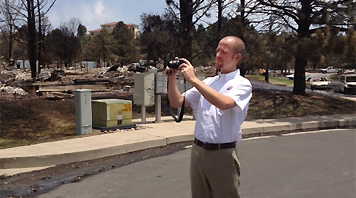|
RMIIA News Releases7951 E. Maplewood Avenue, Suite 110 Contact: Carole Walker, Executive Director Don't Leave Home this Week Without Taking Steps to Protect Your Home and Your Summer Vacation Plans! July 3, 2001 - As you make travel plans during this holiday week and throughout the busy summer vacation months, you shouldn't leave home without packing up a little peace-of-mind. The Rocky Mountain Insurance Information Association offers these tips to help safeguard your property and your travel plans, so that your trip doesn't have you wishing you'd never left in the first place! Protecting Your Home While You're Away
Check Coverages on Your Homeowners or Renters Policy If you are traveling with expensive electronic equipment, jewelry or sporting gear, it may be more cost-effective to purchase a "floater" or endorsement to your homeowners or renters policy. The cost to insure a $1,000 ring would be between $10 and $40 annually. This would provide full coverage for the item, anywhere in the world, usually for one year. Check Your Auto Policy Before You Rent a Car Before you rent a car:
Consider Buying Travel Insurance There are four major types of travel insurance: 1. Trip Cancellation Insurance This would reimburse you if the cruise line or tour operator goes out of business. It would also provide coverage if you have to cancel the trip due to sickness, a death in the family or other calamity listed in the policy. In addition, if you or an immediate family member becomes seriously ill or is injured during the trip most policies would reimburse you for the unused portion of the vacation. The cost is generally 5% to 7% of the price of the vacation, so a $5,000 trip would cost roughly $250 to $350 to insure. Trip cancellation is very different from a Cancellation Waiver that many cruise and tour operators offer. Waivers are relatively inexpensive, costing approximately $40 to $60. They provide coverage if you have to cancel the trip, but they have many restrictions. They must be purchased when you book the trip and will usually not cover you immediately before departure (the time period most people cancel) or after the trip has begun. Most importantly, waivers are not insurance . Cancellation Waivers are not regulated by the state department of insurance, so if your tour or cruise operator gets into financial difficulty, you may not be able to collect. 2. Baggage Insurance or Personal Effects Coverage This would provide coverage if your personal belongings are lost, stolen or damaged during the trip. To insure $1,000 worth of personal belongings for a week, it would cost roughly $50 per year. Before purchasing this type of coverage, find out how much insurance the airline or trip operator provides for your belongings. Also, check your homeowners or renters policy. It will usually provide coverage for off-premises theft. Therefore, if your luggage is stolen, your insurer will pay to replace it, less the deductible. 3. Emergency Medical Assistance This provides insurance and medical assistance for travelers. It would cover you if you had to be airlifted off a mountain due to a skiing or hiking accident or had to stay for a prolonged period of time in a foreign hospital. It would also provide coverage if you got seriously sick or were injured and needed to be flown home. Some commercial airlines require very sick passengers to travel on a stretcher with a doctor. This means that you might have to purchase 10 or more seats on a plane at a possible cost of over $10,000. Before purchasing this type of coverage, check with your own health insurance carrier. Find out what type of coverage you have when traveling abroad and if there are any limits. Also, ask if it will pay to fly you home or to a country with first-rate medical care. 4. Accidental Death This would provide a variety of coverages if you or a family member dies on the trip. If you have a good life insurance plan or made other financial provisions for your loved ones, this may be duplicate insurance. Your credit card company may also provide travel-related services and coverage. You can also purchase travel insurance from either a travel agent or you can buy directly from an insurer that specializes in this type of coverage. ### Rocky Mountain Insurance Information Association is a non-profit consumer information organization. Affiliated with the Insurance Information Institute, RMIIA has been serving consumers and the media since 1952. |
|
303-790-0216 • 800-355-9524 • Contact Us • Legal Notice, Disclaimer & Terms of Use
Home • About RMIIA • News Room • P&C Insurance Industry • Auto • Homeowners • Business • Catastrophes • Agent Resources • Events & Education • Brochures

